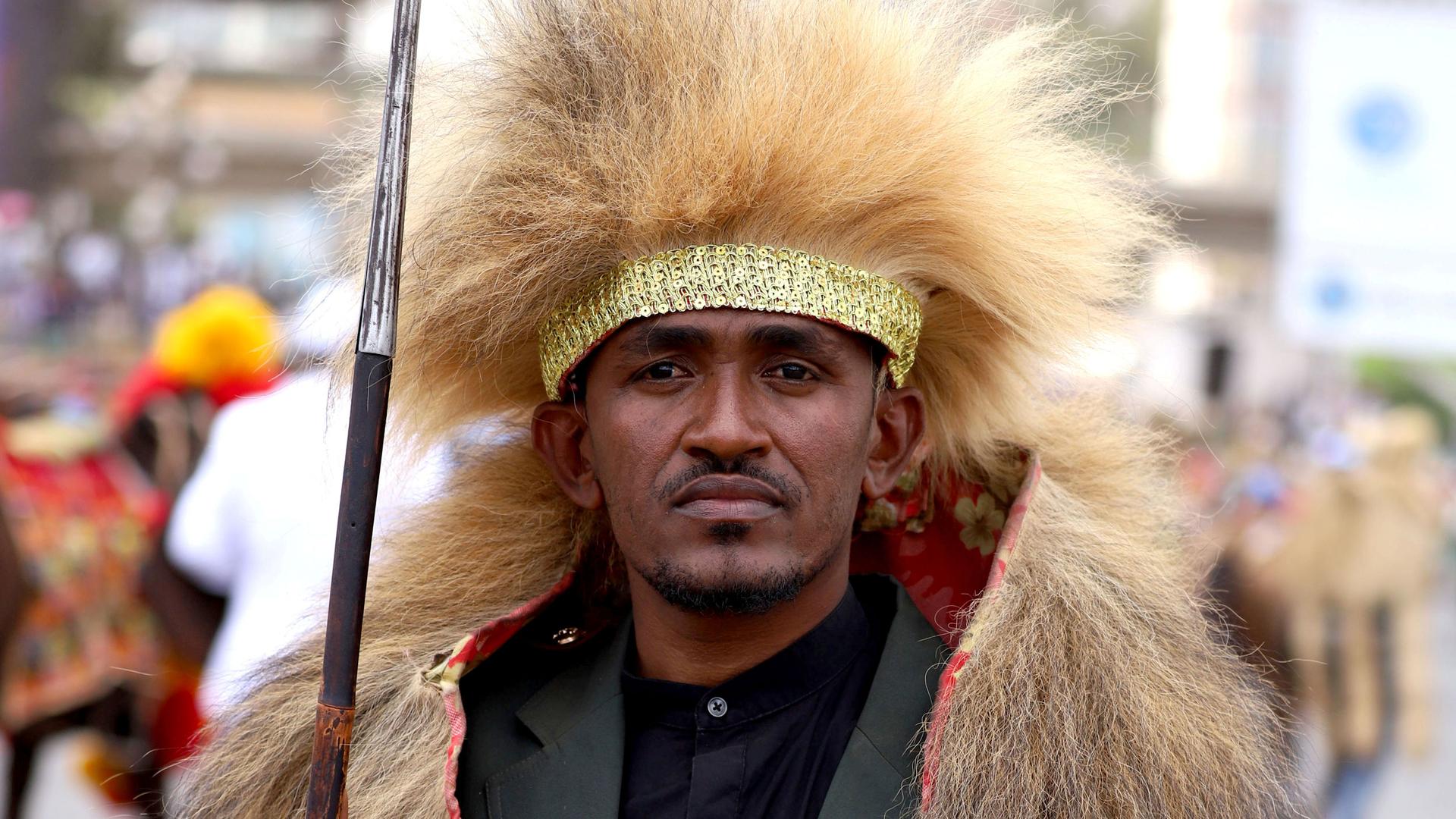Ethiopian musician Haacaaluu Hundeessaa poses while dressed in a traditional costume during the 123rd anniversary celebration of the battle of Adwa, where Ethiopian forces defeated invading Italian forces, in Addis Ababa, Ethiopia, March 2, 2019.
In Addis Ababa, the killing of popular musician Haacaaluu Hundeessaa has triggered widespread protests across Ethiopia this week. More than 80 people have died.
Hundeessaa was a powerful political voice for the Oromo ethnic group. His death is just the latest in nearly a year of troubling developments in Ethiopia, and has become a rallying cry for the opposition to speak out against Prime Minister Abiy Ahmed.
Addisu Lashitew is a global economy and development fellow at the Brookings Institution. He spoke with The World’s Marco Werman about why Hundeessaa’s death sparked mass protests this week.
Related: As Lebanon’s financial crisis worsens, Ethiopian migrants workers dumped in the street ‘like trash’
Let’s start with the death of the singer Haacaaluu Hundeessaa. It’s drawn the attention of the world to wider problems in Ethiopia. Why did Hundeessaa’s killing spark such huge protests?
Haacaaluu was seen as a symbol of resistance against oppression among the Oromos, one of the largest ethnic groups in Ethiopia. So his death seems to have angered and frustrated a lot of people. And that has led to a kind of clash between communities and with security forces. So his songs were very important in unifying the Oromo people during the protests that started in 2015, protest that actually helped bring Prime Minister Abiy Ahmed to office three years later in 2018. The songs became an anthem for the protestors, which helped galvanize the movement.
So that’s interesting, the Oromo people actually had a big hand in bringing Abiy Ahmed to power. So what are their grievances today?
So the demands of the Oromo people are many. Some of them are shared by other Ethiopian people and some others are not. One major point is on the economic issue, which is actually the immediate cause of that protest in 2015. The Oromo live around Addis Ababa, and Addis Ababa was going through a radical transformation in the past few decades. A lot of Oromo were displaced by government projects, many without receiving sufficient compensation. But also political reasons for playing a role as well. Because until very recently, political freedom was quite suppressed in Ethiopia. There was no representation. There was no open elections. Other, non-Oromo ethnic groups were seen to be dominating the political landscape. There are also historical reasons that created a sense of injustice that reinforce existing economic and political factors.
So in addition to Oromo people helping Prime Minister Abiy Ahmed be elected, Abiy Ahmed’s father is also Oromo. So why hasn’t the prime minister been able to address the concerns of these people?
Indeed, Abiy Ahmed identifies himself as half Oromo. He has been a part of an Oromo political party. … I can mention two reasons why he might not have been successful. One is that, many of the reasons are actually very complex. … If you take a look at the issue of economic inequality, for example, creating inclusive policies and following them through takes a lot of time. But Abiy has been in power only for about two years. Secondly, there is also political polarization in the country. Some of the demands of the Oromos clash against the demands of other people. Oromos demand greater representation and greater economic power in Addis Ababa, but people in Addis Ababa also fear an Oromo hegemony.
How is Abiy Ahmed’s government reacting to the unrest this week?
Abiy has been reluctant about taking radical measures until very recently. But this time around, he has actually gone to the other extreme and taken very radical measures, including detaining major opposing politicians. Also, he has closed down a lot of TV channels, many of them run by opposing parties of different ethnic groups. He has shut off the Internet. People are not able to communicate by Twitter. That has cut off the diaspora from the local political voices. So these changes are more radical, compared to the past, and it’s a very controversial move.
Right. And that is a change that we’ve seen this past week. And we have to see it against the backdrop of other deeply entrenched problems in Ethiopia. If we go back to last fall, the international community celebrated the prime minister with the Nobel Peace Prize. And since then, an attempted coup, journalists arrested, the Internet shut down repeatedly — this week just the latest — and now this unrest with the singer popular with the Oromo people killed. What’s going on? Can you help us understand it?
I mean, Ethiopia is going through a very radical and tremendous political change. If you remember at a time of Abiy coming to office, protests were still going on. A lot of displacement of people was happening. There was no stability. Many people also died in the process. So this, to me, looks like a continuation of a lot of change. And you can only hope that through political dialog and openness and discussions, things will settle down.
This interview has been edited and condensed for clarity.
Our coverage reaches millions each week, but only a small fraction of listeners contribute to sustain our program. We still need 224 more people to donate $100 or $10/monthly to unlock our $67,000 match. Will you help us get there today?
